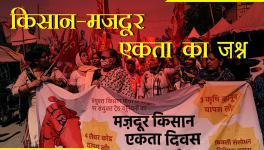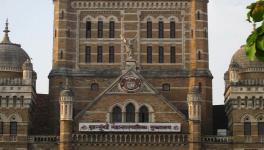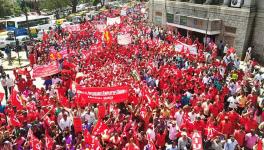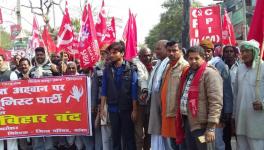#WorkersStrikeBack: The Longstanding Struggle of Garment and Textile Workers in K’taka
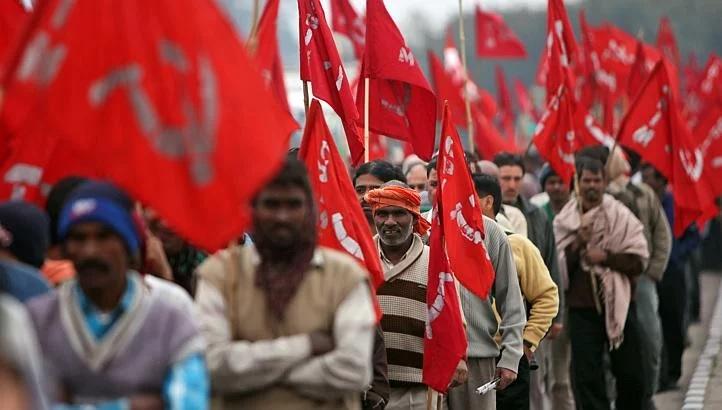
Representational image. | Image Courtesy: socialism.in
[As lakhs of workers gear up for a historic All India Strike on January 8-9, called for by 10 central trade union, Newsclick brings to you glimpses of the lives of industrial workers in different parts of the country.]
Under the joint platform of of 10 central trade unions, workers are going on a strike in Karnataka as elsewhere in the country on January 8-9, 2018.
The state is home to a huge network of garment and textile industries. According to the Garments and Textile Workers’ Union (GATWU), there are 4-4.5 lakh workers in the apparel industry. However, according to a government survey from two years ago, there were 3.75 lakh workers in the state and 857 textile factories.
Jayram of GATWU, speaking to Newsclick, had noted that there are more than 1,000 factories now, and 4-4.5 lakh workers. Eighty percent of these workers in the state are women, and 45 percent of them are from the women-headed households. It is an industry that has maximum number of female employees, but has been overlooked by all the governments.
Also Read: #WorkersStrikeBack: All Set For Historic 8-9 January Strike in Industries, Rural Areas
Just like other workers in the state, the workers of the apparel industry have also decided to participate in the strike; however, speaking to Newsclick, Pratibha from GATWU said, “We have been informed that the factories are going to declare holiday on both the days. They will end up getting compensation for these two days somehow.” The workers, according to her, will still go ahead with the strike even though the managements are granting them a leave. “We have to wait, and see what happens on Jan 8-9. There might also arise a need for us to forcefully shut down the factories and go on strike,” she added.
Also Read: #WorkersStrikeBack: In Karnataka, Workers Gear up to Foil ‘Kamdaar’ Modi’s Privatisation Agenda
The trade unions participating in the strike have a 12-point charter of demands. The following are some of the demands put forward by the trade unions and GATWU along with other left-affiliated unions in the state. These demands include strict enforcement of all the basic labour laws and stringent punitive measures for violation of labour laws, universal social security cover for all workers, minimum wages of not less than Rs 18,000 per month with provisions of indexation, stoppage of disinvestment in Central/State PSUs and strategic sale, stoppage of contractorisation in permanent perennial work and payment of same wage and benefits for contract workers as regular workers for same and similar work, among others.
Garment and textile workers and struggle for minimum wage
The workers in the garment and the textile sector are agitated and angry. The subsequent state governments have completely neglected the industry, and have always been involved in lobbying with the managements in deciding the minimum wage. The law says that the wages have to be increased at least every five years. But in last 38 years, we have seen only four revisions and according to the law, there should have been at least eight revisions.
Also Read: A Struggle for Minimum Wage
On February 22, 2018, the Siddaramaiah-led Congress government in the state had issued a draft notification that promised an increase in wages from Rs 8,500 per month to Rs 12,250 per month. The managements of the garment industries in the state met with the government to discuss this draft notification. They reportedly claimed that they would not be able to pay that high an amount. Without lending its ear to the workers, the government retracted the draft notification on March 24, 2018. The GATWU had decided to protest against this move of the government on April 17, 2018. However, since the chosen date for the protest was too close to the state assembly elections and the code of conduct was in force, the union was not given the permission to go ahead with the protest.
Since it did not work out then, the union had decided to mobilise and protest on May 30, 2018. Due to the pending elections, they were denied permission again. The union planned a protest on June 14, 2018. The call for protest was given by the workers and the unions of four industries. They also had submitted a letter to CM H D Kumarswamy for a dialogue with him about the minimum wages. They were called for a meeting with the CM on June 12, 2018, and in this meeting, it was decided that the union representatives will be meeting the managements on June 18, 2018. At the meeting, the CM directed the officials to set up a committee involving labour department officials, textile manufacturers, central trade unions, and garment workers. The committee is said to be studying the “long-pending issues” of the garment workers including the minimum wage.
Also Read: K’taka Garment and Textile Industry Managements Pressurise the Govt to Curb increase in Wages
Pratibha said, “Nothing has changed after that meeting. The government had set up a committee. However, the managements of 76 industries with scheduled employments in the state have approached the High Court. Those managements are refusing to pay the agreed upon Rs, 18,000, and now we are stuck yet again.”
Struggling against the anti-labour Modi government
The garment and textile industry workers in Bengaluru, spearheaded a movement against the anti-labour policies of the Modi government on April 18 and 19, 2016. As per the Ministry of Labour and Employment’s gazette notification in February 2016 that amended the Employees’ Provident Fund Scheme, 1952, an employee (member of Employees’ Provident Fund) couldn’t withdraw the entire amount of funds from her/his PF account till they attained the ‘new’ retirement age of 58 years. The notification was to come into being from August 1, 2016, but the protests by the women forced the central government to roll it back.
Also Read: #WorkersStrikeBack: Under Modi, 25% Decline in Public Sector Workers
Modi government, in 2016, had also brought about amendments to the labour laws. The garment and the textile industry workers are constantly in a state of friction with the managements. As Remya Nair writes in Livemint, the new rules of the government in the labour laws “allow companies to hire workers on contract for a fixed term replacing the “fixed term employment workmen in apparel manufacturing sector” in the Industrial Employment (Standing Orders) Central Rules, 1946, with “fixed term employment”. According to the rules, no notice of termination will be needed, irrespective of whether workers are contracted for a month, week or the duration of a specific project. Further, workers won’t be entitled to any notice if the contract is terminated”.
Also Read: #WorkersStrikeBack: HP Workers Demand Linking of Minimum Wage to Price Index
Such contractualisation would hinder the livelihood of the workers by snatching away the job security from them. Even though the state government of Karnataka has not implemented any such law, and surely not for the garment industries, the existing lobby of the powerful managements and the state government might find it a fruitful option. For example, one has to wait to witness the government and garment and textile industry management lobby in determining the minimum wage. The determination of the minimum wage is regulated by the Minimum Wages Act. The state Labour Department, industry representatives and the representatives of the trade union work together to fix the minimum wage. However, it is very common for the management to take an upper hand in the process, or after the wage is notified, to create a pressure on the government to curb the increase in the wage. When such is the situation, the anti-labour policies of the Modi government come as a boon to the managements.
Get the latest reports & analysis with people's perspective on Protests, movements & deep analytical videos, discussions of the current affairs in your Telegram app. Subscribe to NewsClick's Telegram channel & get Real-Time updates on stories, as they get published on our website.









